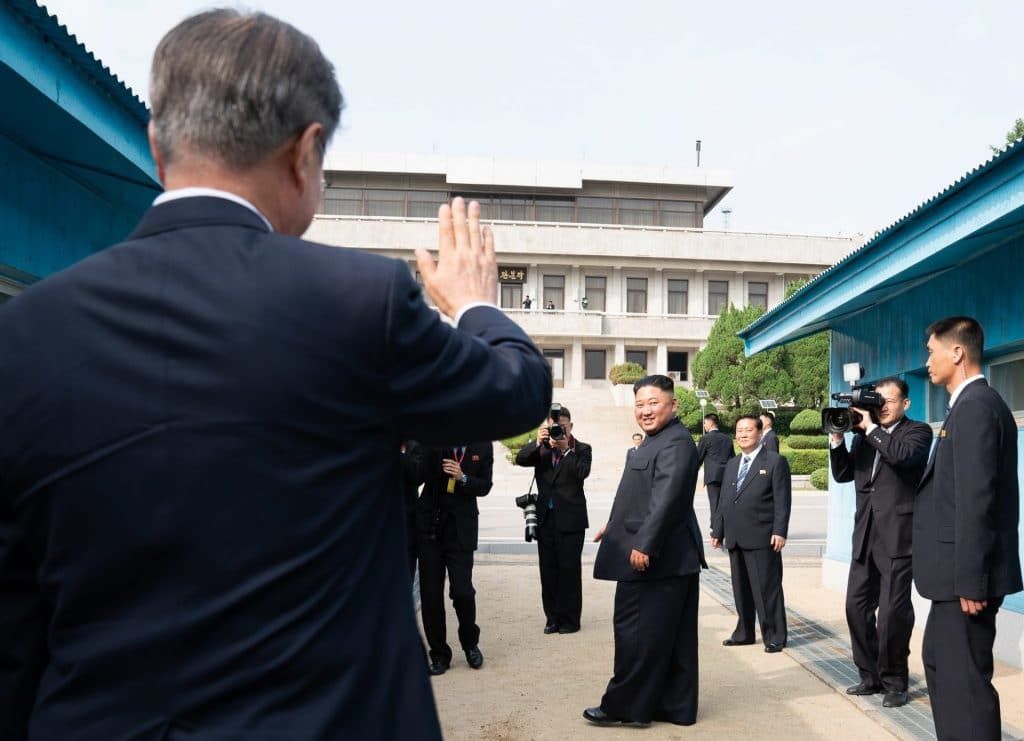After Biden’s election victory, what’s North Korea’s next move?
By Duyeon Kim | November 18, 2020
 South Korean President Moon Jae-in waves goodbye to North Korean leader Kim Jong-un at the demilitarized zone, June 30, 2019. Photo credit: Shealah Craighead, public domain
South Korean President Moon Jae-in waves goodbye to North Korean leader Kim Jong-un at the demilitarized zone, June 30, 2019. Photo credit: Shealah Craighead, public domain
North Korea is unusually mum about the outcome of the United States presidential election. It would not be a surprise if there is some confusion in Pyongyang because President Donald Trump has not yet conceded, and the regime would likely be disappointed about a Trump defeat. After all, to North Koreans, the United States means Donald Trump. He treated North Korean leader Kim Jong-un like the leader of a normal country and met him three times; a feat not even Kim’s father or grandfather could achieve. Perhaps Kim is hoping Trump’s unfounded claims about election fraud are correct.
Whatever the reason, Pyongyang may wait and see before reporting the result domestically and making its next move. But once it is ready, North Korea will have several options in terms of the nature and timing of its next provocation. The incoming Biden administration will need to be prepared not only for how to respond to these but also for how to address existing fissures in the US-South Korea alliance relationship that will outlast Trump and impact the nuclear problem.
North Korea’s next provocation. North Korea has both military and geopolitical drivers to stage another provocation. The question is when and what type. Once Pyongyang realizes Biden is in fact the president-elect, there are two possible scenarios regarding timing. On the one hand, Pyongyang might cross Trump’s “red line” by testing intercontinental ballistic missiles (ICBMs) and nuclear devices during the transition period if it feels pressed to continue refining its nuclear weapons capability and believes that Trump cannot retaliate during his remaining weeks in office. Launching an ICBM (or any class of missiles for that matter) would simultaneously achieve the geopolitical objective of gaining leverage in future negotiations and testing an incoming Biden administration.
On the other hand, North Korea is heavily consumed with a fierce “80-day battle”—a national productivity campaign that began in October during which North Koreans are required to work extra hours to achieve national and economic goals before a rare Workers’ Party congress set for next January. These “battles” are also meant to firmly consolidate domestic unity around the Kim dynasty. State media say their priority this time is typhoon recovery, anti-coronavirus campaigns, farming, coal mining, and scientific research without outside help over fears of viral infections. This means that Pyongyang may wait until after the regime cements next year’s goals during its January party congress. If so, the window for a provocation would be between January and March, when President Biden’s team is not yet complete after inauguration and before the US and South Korea hold their annual spring military drills.
That is the same period during which Pyongyang has tested missiles or nuclear devices in the past after a change in American administrations. The possibility cannot be ruled out that the regime may even wait until it assesses an incoming Biden administration’s attitude toward it. But Pyongyang may not wait—candidate Biden personally called Kim a “thug” (although Pyongyang previously called Biden a “rabid dog” and “fool of low IQ”), which could be enough justification to provoke Washington, especially when Kim’s sister in July expanded the scope of “US hostile policy” to include rhetoric (insults) and human rights criticisms.
There are also several scenarios for the type of North Korea’s next provocation. For one, testing ICBMs will help Pyongyang perfect its capability and inch closer to one day mastering an operational “monster ICBM,” unveiled at its October military parade designed to launch multiple nuclear warheads. While that ICBM signaled another milestone the regime apparently aims to achieve, the shock and wonder of it eclipsed the dire message and significance of North Korea’s other dangerous weapons that can start a war. Perhaps the more urgent of its twin goals is to perfect smaller, solid-fuel mobile ballistic missiles and other weaponry that would be used in actual combat on and around the Korean peninsula as well as for retaliatory strikes.
In this sense, Pyongyang may choose to continue testing those shorter-range missiles, including a submarine-launched ballistic missile; attempt to launch a satellite into orbit; or showcase a submarine armed with a nuclear-tipped ballistic missile or even a nuclear-powered submarine. The significance of such vessels would be to signal that Pyongyang’s submarines are, or will soon be, able to fire missiles further or from various previously-undetected locations at sea, and capable of traveling long distances undetected and perhaps even approach the US homeland. North Korea’s choice of weapon might also depend on how it perceives an incoming Biden administration’s attitude and policy toward it. The degree to which the regime feels aggravated or that Kim’s dignity is harmed could determine the degree of its next provocation.
The future of diplomatic negotiations. The personalities and styles of Biden and Kim will be a challenge for each other. Unlike Trump, President-elect Biden has much experience with and knowledge about the North Korean nuclear issue, so he will not be easily swayed by schemes and tricks. Biden said that principled diplomacy will be his approach in engaging North Korea and that he will meet with Kim only “on the condition that he would agree that he would be drawing down his nuclear capacity.” In other words, the Trump era of handing out freebies is over; Kim will need to work for facetime with Biden, offer reasonable barters, and agree on the definition of denuclearization and the end state of negotiations. But Kim’s preference for summitry and unempowered North Korean negotiators could become a challenge for Biden, who prefers a conventional bottom-up approach to inking international agreements and holding summits.
In the near term, diplomacy will be difficult to jumpstart if North Korea continues missile and nuclear tests while demanding preconditions for diplomatic talks. It recently raised the price for dialogue by citing the removal of US “hostile policy,” which includes the lifting of sanctions, ending US-South Korean joint military drills, and refraining from lodging insults. In response to North Korean provocations, it is plausible that Washington would return to normal levels of joint military drills and deploy US strategic assets to the Korean Peninsula to signal deterrence and reassurance to its Asian allies.
China, Russia, South Korea, Japan, the European Union, and other stakeholders should dissuade Pyongyang from testing weapons and watch carefully as Biden fills his administration’s key positions and reveals a clearer picture of his policy. It is also important that both sides return to negotiations without preconditions and with envoys who are empowered to properly negotiate.
More fundamentally and practically, however, the coronavirus could be the main reason for Pyongyang’s disinterest in direct dialogue, especially amid news about America’s infection rate, which looks frightening from Asia, and North Korea’s apparent hypervigilance in regard to the virus and its fragile health care system. The coronavirus is likely the biggest threat to the country’s survival right now. This means nuclear diplomacy may be kicked down the road for another year.
US-South Korea alliance challenges. Many South Koreans are relieved the next US administration will be more predictable, stable, and conventional in its foreign policy approach than a Trump-led America. But they are also concerned that the Biden administration might mirror the Obama administration’s strategic patience approach, which to them means putting North Korea on the back burner. For decades, South Koreans have wanted the president of the United States to pay priority attention to an issue linked to their country’s survival. Most South Koreans across the political spectrum want summitry to persist. Trump’s unconventional approach and focus on the meetings of leaders was widely lauded because of the top-down manner in which North Korea operates, but frowned upon because of the absence of a real strategy and propensity to undermine South Korea’s security by making unilateral decisions (halting major joint military drills without consultation), essentially extorting Seoul to pay a hefty price tag for hosting US troops, and threatening to reduce the US military presence.
South Korea’s Moon Jae-in government has already begun to actively knock on the door of Biden’s transition team by sending a series of senior-level governmental delegations. Seoul has yet to score meetings, but it will try to persuade the Biden administration to mark the North Korean nuclear issue as a presidential priority whose resolution is driven by the Moon government’s formulation of a peace process, rather than deterrence. Seoul’s most pressing task is achieving Moon’s Korean peace agenda before he leaves office in 2022.
The Moon government will want to seek much flexibility in Biden’s North Korea policy. It would be problematic for Washington if Seoul pushes for the removal of key sanctions and the signing of a war-ending declaration without credible, significant denuclearization measures. It would be problematic for the Moon government if the Biden administration wants to shore up the credibility of its extended deterrent, for example by normalizing their joint military drills, and to hold human rights at the same level of policy importance as denuclearization.
Seoul and Washington need to engage in honest consultation from day one to avoid surprises and hiccups. They should also coordinate and sync their policies closely to incentivize denuclearization and prevent North Korean wedge-driving and extortion tactics. If this coordination does not occur, the early stages of a Biden-Moon alliance will begin on rocky footing with, yet again, public exposure of alliance discord due to existing differences on detailed methods, timetables, and sequences in achieving denuclearization and peace. While the allies and regional stakeholders should seek creative solutions together, it is important to engage in principled negotiations based on proportionate bargains along a denuclearization-peace roadmap.
Together, we make the world safer.
The Bulletin elevates expert voices above the noise. But as an independent nonprofit organization, our operations depend on the support of readers like you. Help us continue to deliver quality journalism that holds leaders accountable. Your support of our work at any level is important. In return, we promise our coverage will be understandable, influential, vigilant, solution-oriented, and fair-minded. Together we can make a difference.
Keywords: Joe Biden, North Korea, South Korea, diplomacy
Topics: Columnists, Nuclear Risk
















The DPRK needs to be treated as a rational actor in order to realistically achieve security not only for the Korean peninsula, but for the whole of Northeast Asia as well.